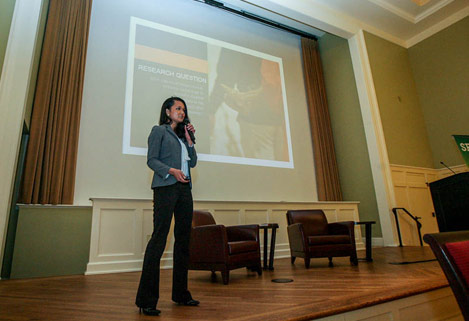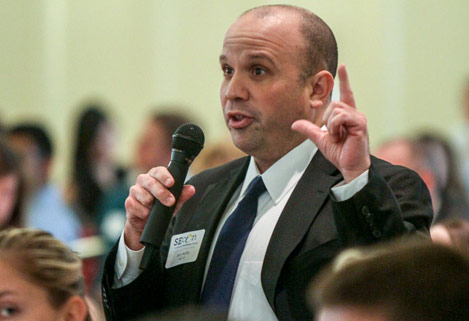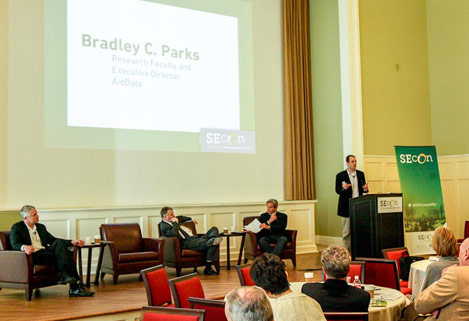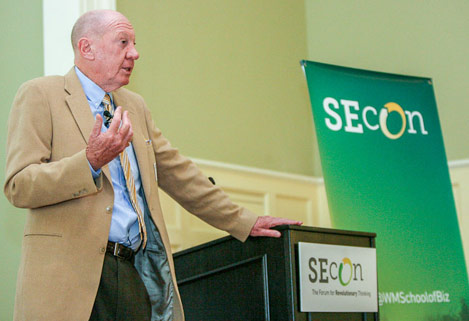SEcon2013 brings social innovation and business together
One year ago, Pat Austria ’13 was standing in the hallway at the Raymond A. Mason School of Business presenting a small poster board on how to improve disaster management in her home country of the Philippines to participants at William & Mary’s first Social Entrepreneurship Conference (SEcon).
On Friday afternoon, Austria took center stage with the CEOs of Forbes, ONE.org and other social impact leaders to unveil the launch of the Lunas Project at SEcon 2013.
Now in its second year, the forum is a meeting place for entrepreneurially minded and socially responsible leaders from the public and private sectors to examine how business practices can address social change. The daylong event began with a keynote by Neville Isdell, former chairman and CEO of the Coca-Cola Company, followed by a panel discussion on the future of social entrepreneurship. Panelists included Michael Elliott, president and CEO of ONE.org; Brad Parks, executive director of W&M’s AidData; and Greg Van Kirk, co-founder of the New Development Solutions Group. Mike Perlis, president and CEO of Forbes Media, served as moderator.
“This past year has been one of tremendous opportunity, incredible generosity and valuable partnerships,” said Austria on Friday afternoon. “I am constantly floored and humbled by all the support I’ve received from the College, which has supported my passion even beyond my own self-confidence.”
Two years ago, the Lunas Project was nothing more than a two-page Word document filled with ideas and concepts, said Austria, to help a country that has suffered greatly from significant gaps in warning, emergency response and relief coordination.
Highly susceptible to typhoons, earthquakes, volcanoes and flooding, the Philippines currently ranks as the third most disaster-prone country in the world, according to the United Nations Office for the Coordination of Humanitarian Affairs. Each year, thousands of lives are lost and millions of dollars are spent due to natural disasters.
While working at the World Bank on geocoding, Austria came up with a “crazy” idea to have a centralized SMS-based national disaster system for the government to communicate with citizens via text messaging. She also envisioned a comprehensive disaster map to better coordinate search and rescue missions and mobilize the community in helping with relief efforts, along with a road system of the Philippines to show accessible areas and to offer alternative routes to aid disaster-stricken areas.
Her idea has now become reality. Austria plans to debut a fully operational website once the project is finalized. She admits that her dream of starting the Lunas Project could not have been possible without receiving seed money from winning SEcon’s 2012 poster competition and a grant from the Roy R. Charles Center. That money made it possible for her to travel to the Philippines over the summer, spend a month conducting research and develop the project.
“After receiving the seed money I really wanted to get started on the software development, but I knew I needed to go back to Philippines,” said Austria. “I wanted to really make sure this project was a good fit and would work.”
While overseas, Austria met with business professionals, government officials, relief organizations and local citizens, pitching her idea for the Lunas Project and gathering feedback on how it could be improved. She also presented to Manny Pangilinan, a Filipino businessman who Austria described as “the Donald Trump of the Philippines.”
“After giving my presentation to Mr. Pangilinan, he told me, 'You are very idealistic, Ms. Austria,’” she recalled. “I was worried, of course, but then he said, ‘The country needs more people like you ... don't give up on your idea.’”
And so she didn’t.
Lunas, which translates to “first-aid” or “help” in Filipino,” was a socially-minded concept created by Austria who was then 20 years old. It’s now being put into action in hopes of crafting a positive change for those living in the Philippines.
“I hope through my experiences students will be inspired to share their ideas,” she said. “Think creatively, find the resources and invest in their passions.”





